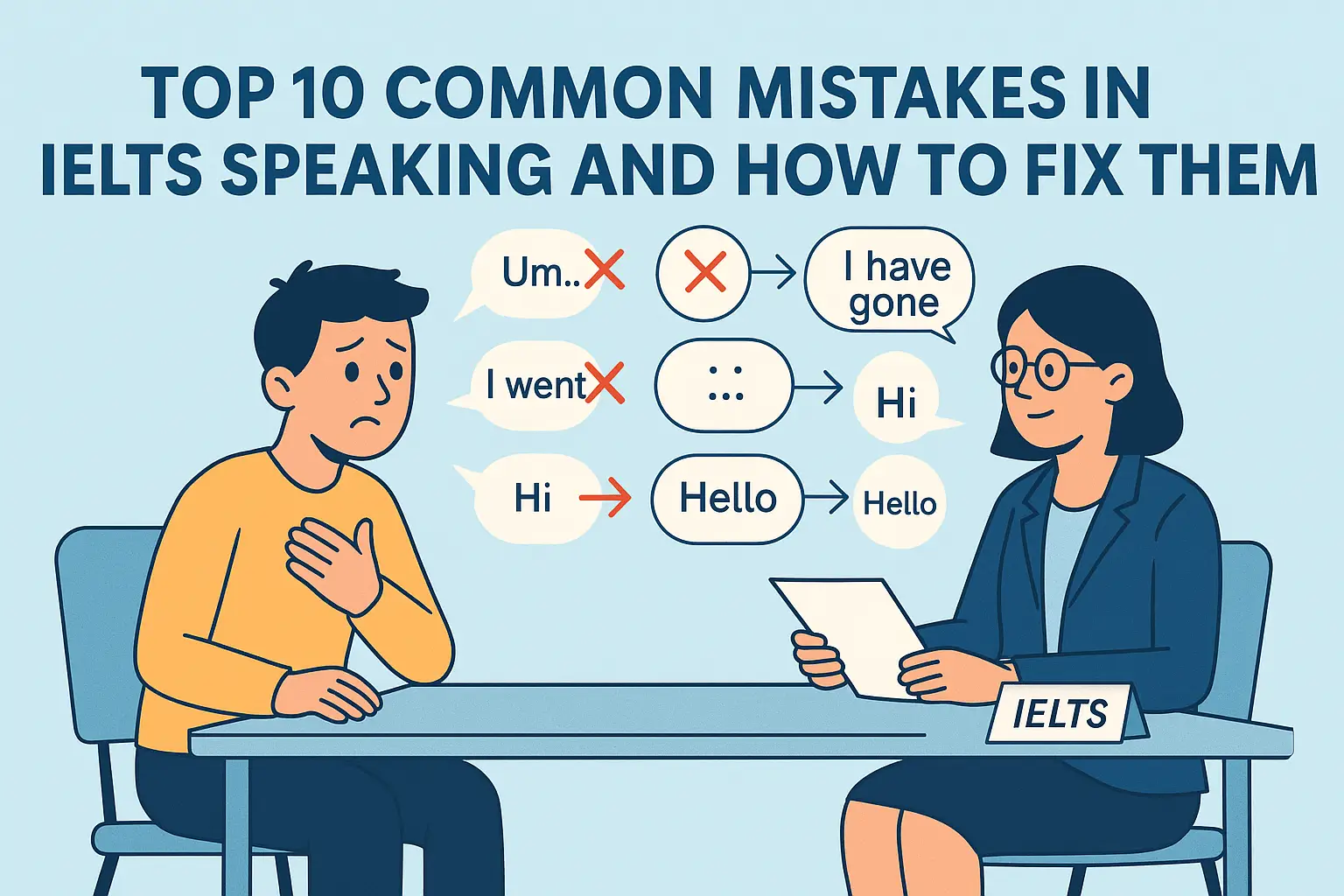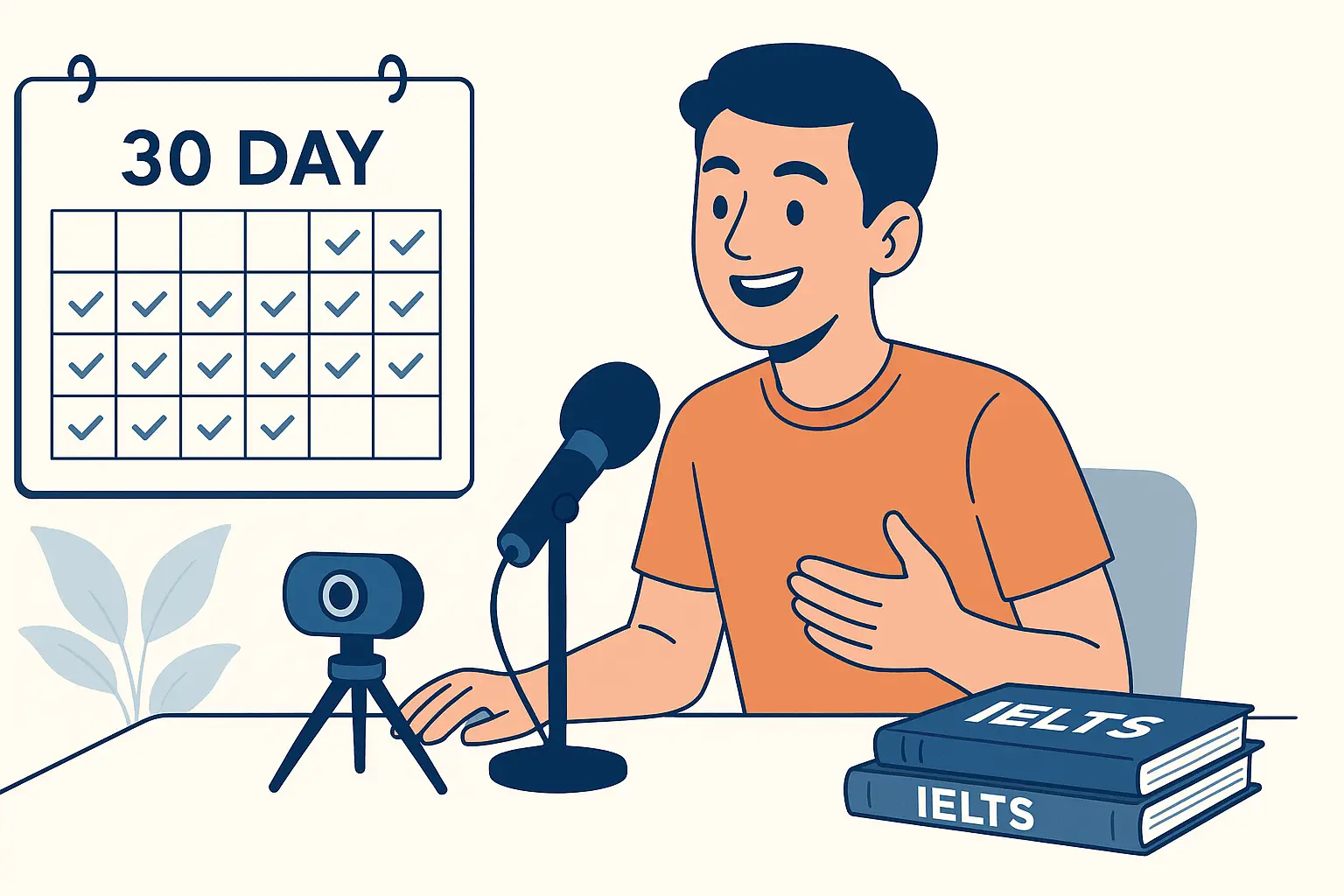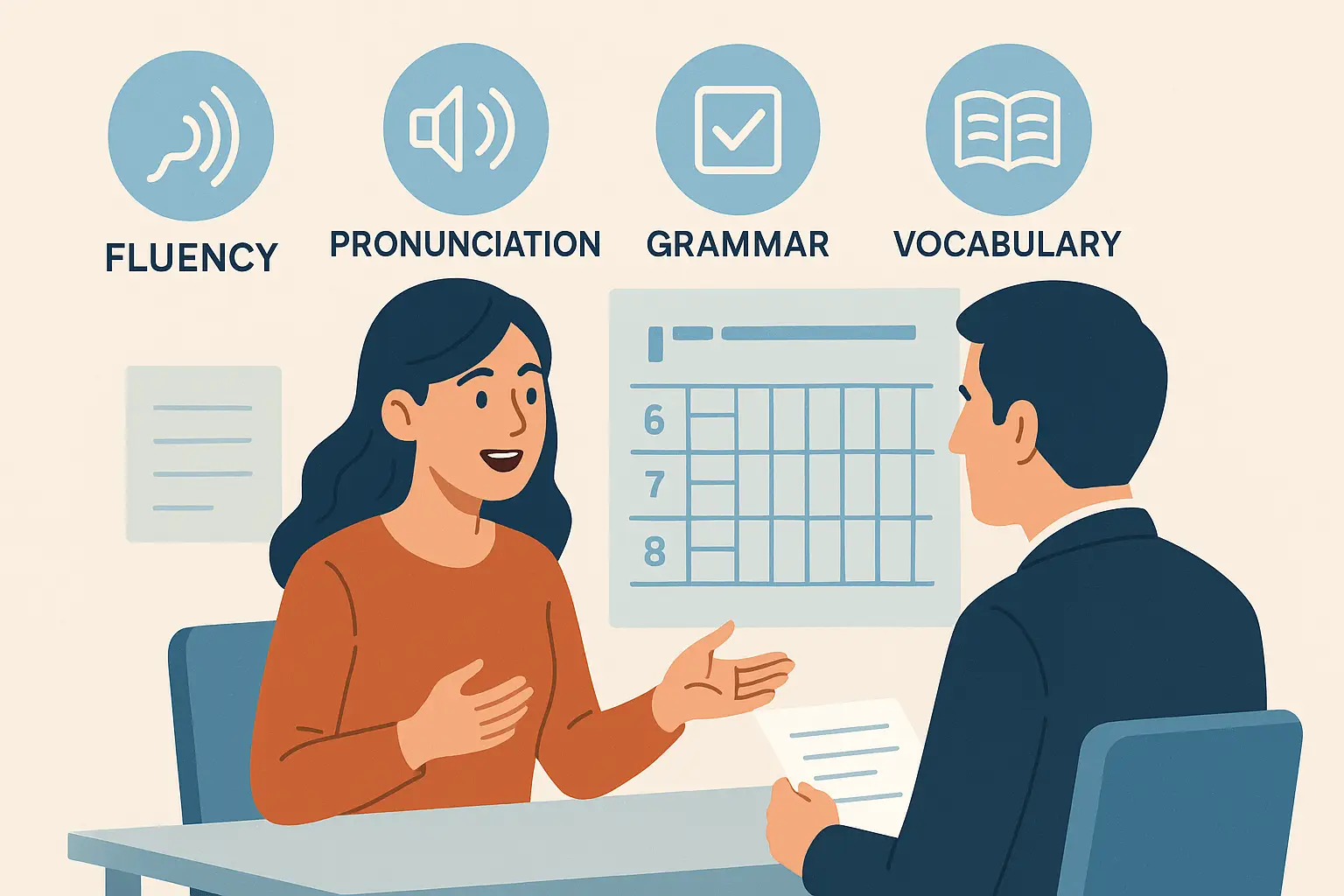- Overusing Fillers Like “Um”, “Ah”, or “You Know”
- Memorising Answers Word-for-Word
- Speaking Too Fast (or Too Slowly)
- Giving Short or One-Sentence Answers
- Repeating the Question Too Often
- Grammar Inconsistency with Tenses
- Using Informal or Slang Phrases Too Casually
- Not Answering the Actual Question
- Flat or Monotonous Tone
- Forgetting to Practise Speaking with Others
- Avoiding IELTS Speaking Mistakes Takes Consistent, Targeted Practice
- Frequently Asked Questions (FAQ)
As an international IELTS teacher who works with students from all over the world, I’ve seen how IELTS Speaking mistakes can be the difference between a Band 6 and a Band 8. Many students lose valuable marks not because of their grammar or vocabulary level, but because of avoidable habits they weren’t even aware of. Today, I’m going to walk you through the top 10 most common IELTS Speaking mistakes my students make—and how you can fix them, starting today.
Whether you’re preparing for your test through IELTS.org, British Council, or IDP, this guide will help you gain the clarity and control you need in the Speaking section.
Overusing Fillers Like “Um”, “Ah”, or “You Know”
Many of my students start answers with “Um… I think…” or use fillers mid-sentence. While it’s natural to pause, too many fillers can suggest hesitation and a lack of fluency.
Fix it: Practice pausing silently instead. Record yourself and replace fillers with a natural pause. Use starter phrases from our IELTS Speaking Complete Guide to build confidence.
Memorising Answers Word-for-Word
Examiners can spot rehearsed answers immediately. I’ve had students deliver perfect responses—but when asked a follow-up, they freeze.
Fix it: Focus on learning structures, not scripts. Practise flexible frameworks for common questions. If you need help, explore strategies on IELTS Practice, Strategies & Common Mistakes.
Speaking Too Fast (or Too Slowly)
Some students rush through their answers trying to sound fluent. Others speak so slowly that they sound unsure.
Fix it: Aim for a natural, conversational pace. Use breathing to regulate speed. Practise speaking aloud with a timer, aiming for 130–160 words per minute.
Giving Short or One-Sentence Answers
When I ask, “What’s your favourite type of holiday?” and the student responds, “Beach holidays,” — that’s not enough.
Fix it: Always expand. Use the “P.E.E.” method — Point, Example, Explanation. Turn “I like beach holidays” into “I enjoy beach holidays because they help me relax. For example, last summer I went to Cornwall, and it was peaceful and sunny.”
Repeating the Question Too Often
It’s okay to paraphrase, but many students simply repeat the examiner’s question before answering.
Fix it: Replace repetition with natural transitions. For instance, instead of saying, “What kind of food do I like? I like spicy food,” say, “When it comes to food, I usually go for spicy dishes like curry or noodles.”
Grammar Inconsistency with Tenses
One common IELTS Speaking mistake is switching tenses mid-sentence, especially when describing past experiences.
Fix it: Be mindful of the timeline in your answer. If you’re talking about the past, stick to the past. Practice telling short stories in the past tense, then check your consistency.
Using Informal or Slang Phrases Too Casually
Yes, the Speaking test is conversational—but overusing phrases like “like”, “kinda”, or “basically” can make your speech sound immature.
Fix it: Replace slang with natural yet formal expressions. For example, use “to some extent” instead of “kinda”. This raises the perceived level of formality without sounding robotic.
Not Answering the Actual Question
Some students go off-topic or misunderstand the question entirely. I’ve seen learners talk about books when I asked about films.
Fix it: Listen carefully and paraphrase the question in your mind. Ask yourself: “What exactly is the examiner asking me to talk about?”
Flat or Monotonous Tone
A monotone voice can make you sound disengaged, even if your vocabulary is good.
Fix it: Practice using pitch and stress to add emotion. Record and compare your voice to fluent speakers from the IELTS Listening section or native podcasts.
Forgetting to Practise Speaking with Others
Many students practise alone or with AI tools—but don’t engage in real conversations. Then, on test day, they struggle under pressure.
Fix it: Practise with friends, tutors, or speaking clubs. Simulate exam conditions. The more you practise, the more natural your responses will be.
Avoiding IELTS Speaking Mistakes Takes Consistent, Targeted Practice
Now that you know the top 10 IELTS Speaking mistakes, it’s time to build self-awareness and break these habits. I’ve worked with students who improved from Band 6 to Band 8 in just 4 weeks—not by learning hundreds of new words, but by fixing these key issues.
Review your past performances, track your most common errors, and seek feedback from experienced instructors. You can also explore full breakdowns and coaching strategies in our IELTS Speaking Complete Guide.
Frequently Asked Questions (FAQ)
Q1. Will I lose marks if I say “um” or “ah” in my IELTS Speaking test?
Yes—if overused. Occasional fillers are acceptable, but frequent use affects your fluency score.
Q2. Is it okay to use informal words like “gonna” or “wanna”?
No. Use full forms like “going to” or “want to” to maintain clarity and accuracy.
Q3. Can I memorise answers for common IELTS Speaking questions?
No. Examiners are trained to spot memorised responses. It can reduce your score.
Q4. What if I make a mistake during my answer? Should I correct it?
Yes—but only if you catch it naturally. For example: “I has—sorry—I have been learning English for 5 years.”
Q5. How do I know which IELTS Speaking mistakes I’m making?
Record your answers regularly. Compare with high-scoring samples and use structured checklists. Our Practice & Common Mistakes page can help you evaluate effectively.





